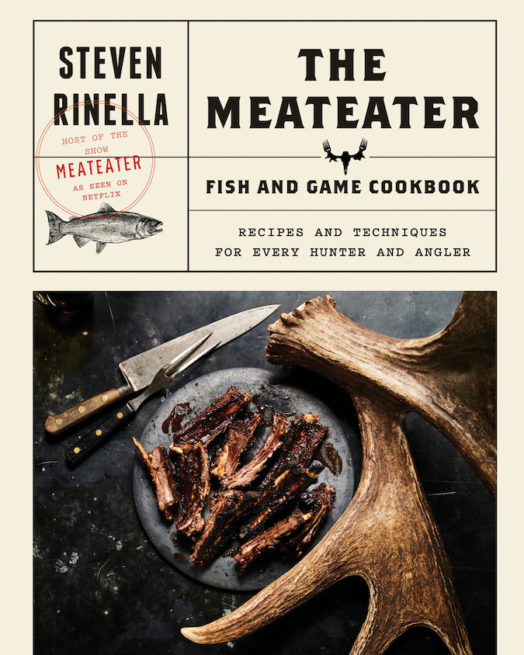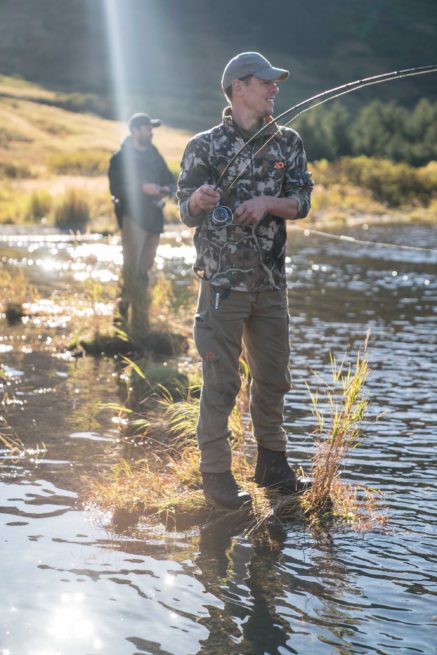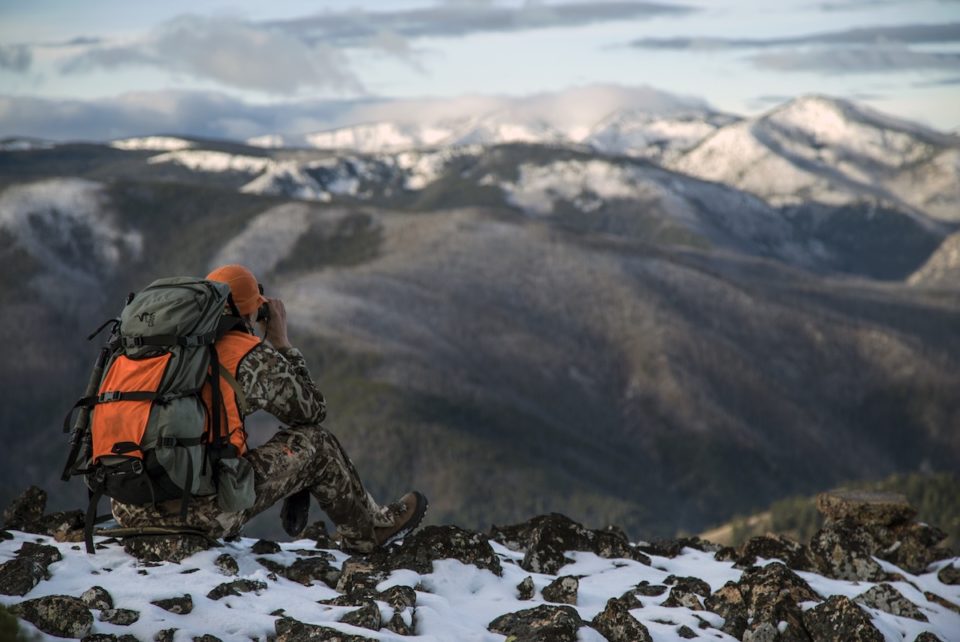Earlier this summer, Andrew Clyde (R-GA), introduced a bill to Congress that could, if passed, gut conservation funding. Called the RETURN Act (Repealing Excise Tax on Unalienable Rights Now) our Constitutional Rights Act), it would eliminate the excise tax on firearms and ammunition that directly support conservation funding. In 2021 alone, that tax collected $1 billion dollars. It’s controversial even among the GOP, though it has support from many lawmakers. Reading about the bill reminded us of this interview with America’s hunter and articulate conservationist, Steven Rinella. We decided to put it back on the homepage for new readers to see. – Ed.
The Meateater television show on Netflix and the podcast of the same name are about as simply and aptly named as it gets. Hosted by Steve Rinella, Meateater is first and foremost about hunting. But it’s not only about hunting and if you’ve never seen the show or listened to the podcast, it’s probably nothing like you’d expect from a hunting program. It could just as easily be called “The Conservationist.” Rinella is no trophy hunter. He hunts for food. He cares deeply for wildlife, their habitat, and our relationship, as humans, to not only the land we live on but the food we eat.
Through both his books and his digital media, Rinella has built up a fan base among people—like myself—who’ve never hunted a day in their lives but who care deeply about public lands, ecological protection, and healthy populations of native wildlife. Vegans watch his show. Anti-gun advocates listen to his podcast. It helps that Rinella is thoughtful, articulate, and a deep appreciator of the natural world around him. He’ll sit on a hillside for an entire episode scanning for elk herds with binoculars, see none, but manage to share his subdued reverence for the wild places that elk call home. A philosophical, deeply ethical hunter. But also, his show is fun, funny, and filled with really great food.
We spoke with Rinella by phone recently to talk about why Meateater is so popular among non-hunters and what the non-hunting world can learn from hunters about conservation.
Rinella’s programs show that hunting is largely about learning the intricacies of an environment and melding into it as best as possible. Photo: courtesy of The Meateater.
ADVENTURE JOURNAL: How many people come up to you when you meet them and say they don’t hunt but they love what you’re doing? Or maybe even they’re disgusted by hunting in general but they enjoy watching your show or listen to your podcast.
RINELLA: You know, it’s becoming increasingly common. I think a lot of it has to do with being on Netflix for sure. They push our show out to a great big audience. People who might be interested in the culinary space or people who might be interested in adventure travel are being offered the show. And also the conversations. We have pretty lively conversations around sustainability issues and wildlife conservation, wildlife politics, it’s a deep, deep subject.
I think a lot of people who pay attention to wildlife will come in and check out the show on the internet. They’re interested in the politics of food, and they’re interested in the politics of wildlife, and wind up kind of looking in to see what we’re doing.
Do you get the sense that this is an emerging cultural moment for “hook and bullet”? That there might be a curiosity from parts of outdoor culture that weren’t previously attracted? Or has the Meateater been a pretty unique sort of voice in this space?
There’s a market for people who want to have really in-depth conversations around hunting and fishing, that aren’t just guys driving around in a truck drinking beer. Which is a common misconception people have. Because of the expectations that people have and the stereotypes people have about outdoorsmen, our program winds up being kind of a surprising thing.
There’s also a reckoning going on about using natural resources, that it comes with tremendous responsibility. People in this country are increasingly having bigger conversations: “We have to take care of the natural world.” Not that people haven’t been talking about this for decades, obviously, it really began with Theodore Roosevelt, Aldo Leopold, etc.—it’s an old conversation. I think there’s a growing number of people who are willing to talk about [natural resource use] and it resonates with people who are saying, “Man, I am really, really drawn to the idea of going out and hunting my own food. But I’m not naive enough to think that this doesn’t come with some serious responsibility and there’s a right way and a wrong way to go about this.” And I think that those people, who feel that real desire to be involved and want to have an interactive relationship with the natural world, they also have a sense that this is a heavy duty thing that needs to be done right. They want to have this conversation, they know to come find us because we’re sort of approaching it that way.
I’m not sure many non-hunters or non-anglers know about things like the Pittman-Robertson Act or the Dingell-Johnson Act (excise taxes levied at the point of sale on hunting and fishing equipment, respectively that fund wildlife conservation and habitat restoration programs, among other things), and I’ve long wondered why the same sorts of taxes aren’t levied on camping and hiking-oriented gear. What are your thoughts on that divide?
Those taxes pump about a billion dollars annually into state wildlife conservation. So, in this country, we have different agencies that manage plans. Federal land management agency, state land planning agencies. Your state agencies, it varies by agency, draw about 60 to 90 percent of their funding from excise taxes, Pittman-Robertson and Dingell-Johnson, and the sales of hunting and fishing licenses, tags, stamps, etc. For some state agencies, the funding wholly comes from those taxes. No funding comes from the general taxpayer into some of those pools.
This covers enforcement of hunting and fishing laws, disease research, habitat improvement, public access to public waterways, and public lands. Hunters and anglers foot that bill. Now again, is this because they’re donating money? Well, no, it’s because back in the Franklin Delano Roosevelt administration, we committed to the idea that if hunters wanted to hunt, and at that time, it was the dark ages, American wildlife was threatened because of rampant habitat destruction from unregulated market hunting, so Roosevelt put it to the hunters and anglers and said if you want to even be able to consider the idea of being a hunter, you’re going to have to pay for it, no one else will pay for it. And so we put that tax system in place.
But when people bring up this idea of a “backpack tax,” where say, birdwatchers, or downhill skiers, or cross-country skiers, or mountain bikers, or whatever, might start footing the bill for wildlife and conservation [through taxes on gear], it generally seems that that industry has some sort of allergy to having that conversation. They’ll tell you, “Oh, we’ve already paid enough taxes.” But when you buy a box of shotgun shells to go doe hunting, 13 percent of that price goes to wildlife, has to go to wildlife.
It is not by accident that the most popular game species are so well taken care of, because they have enormous advocacy. You go trying to mess with elk, and you are going to run into a real serious problem. Because people love their resources, they fall on the floor to protect them.
Do you think a backpack tax should go into law then?
I would love to see it happen. I would happily pay five, ten, whatever percent more if I knew that everyone else was doing the same thing and that that money was going to state wildlife agencies, absolutely. I’ve got no problem with that. I’m not really worried about overspending on behalf of the wilderness. You know, it’s not by accident that we have the wildlife resources that we have today. It is not by accident that the most popular game species are so well taken care of, because they have enormous advocacy. You go trying to mess with elk and you are going to run into a real serious problem. Because people love their resources, they fall on the floor to protect them.

Rinella, fishing with an alternate means, on a trip to Guyana. Photo: courtesy of The Meateater.
Though it does seem like hunting is getting a bit more attention from non-hunting outdoor media—this interview is, I suppose, an example—there’s still often a divide between hardcore hunters and hardcore outdoor enthusiasts who don’t hunt. A shame, really, since united we’d be such a massive force for conservation and public lands advocacy. Can we close that gap?
I call it the trailhead tension. It’s very real. The burden doesn’t just lie with non-hunters though. I’m not going to come and say as a hunter “It’s all their fault.” I think that it would be really smart for hunters and anglers to learn their history. In the European model of hunting and fishing, wildlife was attached to privilege and property. When we started the United States we had to deal with this question. Through the Declaration of Independence, those things that were the rights of the sovereign—fish and game—were now the rights of the people. It does not say that fish and wildlife [and public lands] are the property of those who buy hunting and fishing licenses. It is the property of the American people. I think that it would be wise for hunters and anglers to understand what exactly that means—that this is something that they have access to because it is owned by all of us. When we are shaping our decisions around how we’re going to treat, manage, handle and utilize fish and wildlife, to understand that this is something that’s managed by the collective we.
Understand the history here too. Market hunters nearly drove the buffalo to extinction. People who were shooters, who in an unregulated fashion, with no oversight whatsoever, killed off American wildlife in order to sell it to the large metropolis; shot all the ducks, shot all the buffalo, shot all the deer, sold it off. It was hunters that eventually put in place the extremely fixed system [of wildlife management] that we have today. It’s not even a debatable point to say that America has the most successful and progressive form of wildlife management in the world. That was architected by hunters and anglers. So again, it’s people opening up, gaining an awareness of not only where we are now, but where we were and how we got to where we are now.

How can what you’re doing with Meateater help that?
The goal here is to expand conversations around hunting and resources and to ask: Where are hunting and fishing going in America right now? And what are some of the responsibilities we have? What does the future look like? What do we need to do to ensure the safety of the resources and the lifestyle? I think that it will have positive effects. We’re creating a lot of interest among people who did not grow up familiar with these things. It’s my intent that it’s going to make positive steps to address a lot of the things that we’ve been talking about here.
Well, you’ve got this non-hunter thinking about what’s at stake when I eat meat. I actually was on a mountain bike ride last night and I almost ran over this little rabbit that just burst out of the bush right in front of me and my first thought was well if I run this thing over, I’m gonna have to bring it home and cook it—that’s what Rinella would have done. I mean, I just missed it, but one of these days I’m gonna nail one and it’ll probably be my first hunt. I was thinking about what you would do when it happened.
Well, you’ll have a moral obligation to that animal but then you might wind up being ticketed for having it in your possession.

Source: advanture-journal


1 comment
Muchas gracias. ?Como puedo iniciar sesion?